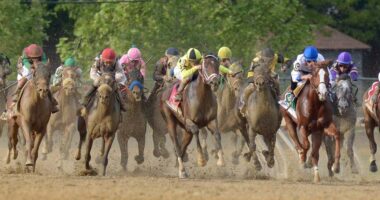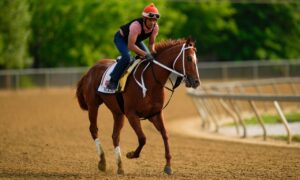
Wow, it’s time to listen to some horse race songs! Get ready for the arrival of the Preakness!
As we eagerly await the second leg of the Triple Crown, we have compiled a collection of the finest horse race tunes spanning various genres, including Broadway, country, and Celtic punk.
While you indulge in the convenience of online horse betting in VA, groove to these tunes. And if you’re seeking a reliable platform solely devoted to horse betting, check out the TVG app.
No. 1 Fugue for Tinhorns
I have obtained the horse right at this moment. Its name is Paul Revere. Additionally, there is an individual who claims that if the weather remains clear, the horse is capable of achieving certain tasks. This person firmly believes that the horse can indeed perform these tasks.
The lively melody of this trio originates from the renowned musical “Guys and Dolls.” Following its immense success on Broadway, the film adaptation was released in 1955, featuring the incredible musical compositions by Frank Loesser and starring Marlon Brando and Frank Sinatra.
Indeed, Brando showcased his vocal abilities, which happened to be opportune, as it would have been peculiar had he suddenly erupted into a joyful romantic melody in “The Godfather” or “Apocalypse Now.”
Despite the movie focusing on Nathan Detroit’s (played by Sinatra) attempts to organize a floating crap game, this song serves as the opening, instantly immersing us in a cheerful world of gamblers. It sets the tone for the film, assuring us that a positive outcome awaits us.
Everyone participates in singing and dancing, with guys embracing their dolls and vice versa, while ensuring that nobody ends up in prison or at Gamblers Anonymous.

Song trivia:
- The show “Sesame Street” featured it twice – once in its original form, and another time when it was transformed into “Can Read.”
- Despite being expelled from high school and failing college, songwriter Frank Loesser defied all odds and triumphed by winning prestigious Tony, Grammy, and Academy Awards.
No. 2 The Race Is On
The competition has begun, and pride is making its way up the backstretch. Heartache is maneuvering towards the inside lane, while I am desperately trying to hold back my tears, preventing them from falling. My heart is no longer in the running, as true love has been sacrificed for someone else’s benefit. The race is in full swing, and unfortunately, it seems that heartache is likely to emerge victorious, resulting in the ultimate loss.
Popular songs have employed various metaphors to symbolize the concept of “love”.
- The Battle commences with the mighty anthem, “I Am the Warrior.”
- Boats (“Rock the Boat”)
- The thrilling and exciting amusement ride known as the “Rollercoaster of Love”.
- The topic of illness is explored in the songs “Fever” and “Bad Case of Loving You”.
- Prison (“Chains,” the Beatles)
In “The Race Is On”, horse racing serves as a metaphor, as the singer’s beloved is leaving him for someone else (“another’s sake”). Interestingly, the singer seems to have an unusual fascination with horse racing, which could possibly be a contributing factor to his sweetheart’s decision to depart.
The 1970s hit “Feelings” was more explicit than this. (With lyrics like “Feelings, whoa whoa whoa whoa whoa feelings, nothing more than feelings…”)
Don Lynn wrote the song, which was initially recorded and released by the renowned country artist George Jones in 1964. Shortly thereafter, it was separately recorded and released by Jack Jones, a pop singer. Interestingly, Jack Jones happened to be the son of Alan Jones, who was one of the stars in the Marx Brothers’ film “A Day at the Races.”
George Jones’ song reached the third position on the Billboard Hot Country Singles Chart, marking his sole entry into the Top 40. On the other hand, Jack Jones’ rendition climbed to the peak of Billboard’s Easy Listening Chart.
Various artists have covered “The Race Is On,” including performers such as:
- Waylon Jennings
- The Grateful Dead
- Sawyer Brown
- Elvis Costello (in concert)
- Alvin and the Chipmunks

No. 3 Cripple Creep
I was struck with good fortune as luck came my way. I swiftly made my way to the race track. She placed her bet on a particular horse to secure victory, while I opted for another to claim a respectable position. The odds seemed to be in my favor, as I had them at a favorable five to one. As the race unfolded, that horse I had placed my bet on made its way around the track, ultimately emerging as the triumphant winner, just as I had anticipated.
Given the catchy chorus, it is likely that the majority of individuals associate The Band’s 1969 release with a joyous and intoxicated love song.
She sends me up on Cripple Creek, repairing me if I stumble. I don’t need to utter a word, as she stands up for me. It’s a vision of bliss for any intoxicated soul.

The song dedicates a significant portion to the fortunate outcome of a horse racing bet. Moreover, the singer not only emerges victorious in his wager but also endeavors to share half of his winnings with his girlfriend, Bessie. Following this act, a series of events unfold.
Just to amuse herself, she ripped it apart and flung it in my face.
Bessie, that seems quite ridiculous. It’s possible that drinking and gambling aren’t a good combination.
Song trivia:
- It achieved the 25th position on the Hot 100 chart of Billboard.
No. 4 Run for the Roses
Race for the roses swiftly<br>As swiftly as you can<br>Your destiny is bestowed<br>Your moment has arrived<br><br>It is an opportunity of a lifetime<br>In a lifetime filled with opportunities<br>And now is the perfect time for you<br>To partake in the joyful dance
In just a span of two days, singer/songwriter Dan Fogelberg managed to create this 1980 tune, leaving us uncertain whether he took any breaks for sleep. As per lyrics.com, the song was commissioned by ABC specifically for their telecast of the 106th Kentucky Derby, and they provided a sneak peek of it during their TV special on Derby eve.
In 1886, the Derby earned its alternate name, “the run for the roses,” as the victorious horse is adorned with a lavish blanket consisting of 554 roses. This delightful tradition was sparked by a New York socialite who, in 1883, bestowed roses upon her female party attendees, serving as an inspiration for this longstanding tradition.
It is uncertain if horses have a fondness for roses. Perhaps they would prefer something different, such as a gift card to Apples R Us. Alternatively, a blanket bearing the phrase “Get off my back!” could also be more preferable to them.
Fogelberg openly expressed his affection for horses when discussing the song, which is quite evident. Unlike most people, horses don’t typically inspire romantic love songs like the Bee Gees’ “Fanny, Be Tender with My Love” does.
However, that idea is unlikely to be effective at the Derby, especially during years when there are no horses or jockeys named Fanny.

No. 5 & 6 Bottle of Smoke vs. Ascot Gavotte
I express my gratitude and admiration to Jesus for guiding me towards placing a wager on the Bottle of Smoke. I embarked on a journey to both hell and the races, all with the intention of betting on the Bottle of Smoke.
If you’re sensitive to strong language, you might consider skipping this lively, energetic, and spirited song from the renowned Irish band The Pogues in 1988. It’s filled with the “f” word, so be aware.
The joyful vocalist successfully wins his wager and decides to spend a portion of his winnings to enjoy some personal solitude away from his family on a Saturday evening.
In comparison to the risqué melody, the “Ascot Gavotte” from the timeless stage and film production of “My Fair Lady” presents a stark contrast. This captivating musical narrates the transformation of a Cockney flower girl into a sophisticated lady, all under the guidance of a condescending professor of phonetics.
My heart races, my face turns red, my heartbeat quickens; I’ve never been this excited. In a matter of moments, they will start running. Oh, listen! A bell is ringing, and they are springing forward. Look, the race has started.
In spite of the lyrics, the refined audience, who are barely distinguishable from mannequins, always maintains their composure. No profanities are uttered. Only Eliza, the flower girl undergoing a transformation, displays any liveliness, astonishing the extremely proper crowd by exclaiming, “Come on, Dover, move your blooming posterior!”
Song trivia:
- The Tony Award for Best Musical was won by “My Fair Lady”.
- The Best Picture Oscar was awarded to the 1964 film adaptation of “My Fair Lady”.










